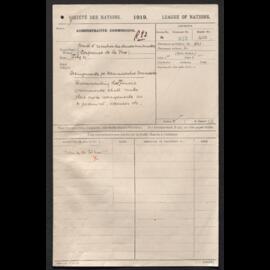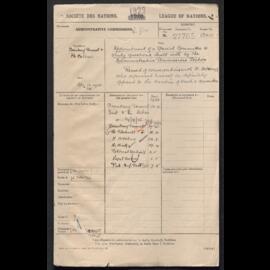Identity area
Reference code
Title
Date(s)
- 1919-1946 (Creation)
Level of description
Extent and medium
528 boxes - 6 volumes - 1 index cards box
Context area
Name of creator
Administrative history
The Administrative Commissions and Minorities Section was established to apply some obligations imposed, directly or not, by the Treaty of Versailles to the League of Nations and involving administration or arbitrary activities.
This Section prepared the work concerning the question of the Saar Territory and the status of the Free City of Danzig, received the petitions of the minorities of race, language or religion, prepared the work of the Council concerning the minorities as well as the related documents.
1) Administrative Commissions:
The concept "Administrative Commissions" referred mainly to the Saar Basin Governing Commission and the High Commissioner at Danzig. It also concerned the arbitrary organs created in Upper-Silesia further to the 1922 German-Polish Convention of Geneva, the Greco-Turkish and Greco-Bulgarian Commissions for the exchange of populations and the special organs created for the Saar plebiscite.
In 1934, affairs related to the "Administrative Commissions" were taken over by the "Political Section".
a) Saar territory:
As stated in the 1920 Peace Treaty of Versailles, the Territory of the Saar Basin (located to the West of Germany, with its population of over 800 000) was to be placed under the administration of the League of Nations for 15 years (1920-1935). During that time, the Saar was to be isolated from the rest of Germany, and as compensation for the war destruction of coalmines in Northern France, together with what was owed by Germany as war reparations, France was given control of Saar Basin coalmines.
The administration of the Saar was entrusted to a Governing Commission consisting of five members appointed by the Council of the League of Nations: one French member, one native German inhabitant of the Saar, and three residents of countries other than France and Germany.
In agreement with the Council, the Governing Commission decided that a way must be found of taking the opinion of the inhabitants, and for that purpose it set up, in March 1922, an Advisory Council consisting of thirty representatives elected by direct, equal, universal suffrage, with the secret ballot. It also set up a Technical Committee of eight nominated members, born and resident in the territory, whose duty was to give technical advice on all matters submitted to them.
It was laid down that, at the end of 15 years of League of Nations administration (that is to say on 13 January 1935), a plebiscite should be held to enable the inhabitants of the Saar to indicate how they desired to be governed - whether they desired a continuation of the international regime, attachment to Germany, or attachment to France. Over 90 per cent of the votes cast called for the immediate reintegration of the Saar into Germany. This decision took effect on 1 March 1935.
b) Free City of Danzig:
Similarly, in the East of Germany, the League of Nations was made responsible for guaranteeing the constitution of the City of Danzig and the surrounding territory, which had been detached from Germany and made into a free State so as to enable Poland to have access to the sea, as had been promised in President Wilson's Fourteen Points.
Danzig was to be self-governing, though under the League of Nations' protection. Poland, however, was to govern the City's foreign affairs and maintain certain transit, postal and harbour rights. The League of Nations established a High Commission to oversee this district. The High Commissioner appointed by the Council was to reside in Danzig and make the final decision in cases when mutual agreement between disputants could not be reached.
2) Minorities Section:
The authors of the Peace Treaties realized that, in some countries, nationalities were intermingled to an extraordinary extent, and that the "minority" factor had been one of the main underlying causes of the great war. They endeavoured to create, through the peace settlement, a Europe more evenly balanced in the distribution of nationalities.
The League of Nations constituted itself by treaty the guardian of some obligations not embodied in the Covenant, such as the so-called "minority" obligations assumed either under the Minorities Treaties or under special Conventions, or in various Peace Treaties, or in declarations made before the Council by a number of European and Near-Eastern States (Poland, Czechoslovakia, Yugoslavia, Romania, Greece, Austria, Bulgaria, Hungary, Turkey, Finland, Albania, Lithuania, Latvia, Estonia, Iraq).
After the war, these States had to sign agreements granting religious, social and political equality to their minorities, whether or not they had been defeated. In order to supervise these agreements, the League of Nations set up the Minority Section, whose influential programmes were rather unique at that time. Its responsibilities included screening the incoming petitions, requesting responses from the accused States, forwarding cases to the ad hoc "Committee of Three", and/or investigating matters on its own. If the case appeared before the Committee, a decision had to be made as to whether or not the Council's involvement was warranted.
In the beginning, the reports were unofficial; however, after 1929, the Council decided that the reports were to be published in the League of Nations' Official Journal.
In 1939-1940, the Administrative Commissions and Minorities Section was merged into Department I.
Repository
Archival history
Immediate source of acquisition or transfer
Content and structure area
Scope and content
Appraisal, destruction and scheduling
Accruals
System of arrangement
Subject files
Conditions of access and use area
Conditions governing access
Public
Conditions governing reproduction
The copying, reproduction, and publication of documents of the fonds to which the access is given shall be subject to the following principles: a) the United Nations is not in a position to release the researchers from any obligations in respect of copyright held by persons whose works may be found in the archives, b) the reproduction or publication of large bodies of files (whole archival groups or large series therein) shall not be permitted; c) the United Nations services shall not be obliged to carry out the actual work of reproduction, even against payment.
Researches who have made use of the LON Archives as a source for their work shall supply two copies of any resulting publication to the UN Library in Geneva. For preservation reasons, it is not allowed to photocopy original paper files nor to scan them by means of a personal scanner.
Language of material
- English
- French
Script of material
Language and script notes
Physical characteristics and technical requirements
Finding aids
Allied materials area
Existence and location of originals
Existence and location of copies
Related units of description
-
The French National Archives (Paris) hold files concerning the military administration in Upper-Silesia and the Saar plebiscite - Contact : Centre Historique des Archives Nationales - 60 rue des Francs-Bourgeois - F-75003 Paris;
-
The other parts of the Fonds of the Secretariat concerning the Administrative Commissions and Minorities are the Political Section, the Social Questions Section, the Communications and Transit Section (Danzig in particular), the Economic and Financial Section, the Legal Section and the Mandates Section;
-
The Refugees mixed archival group is interesting for the Near East;
-
In the External Fonds see the files of the Balkan Commission, the Saar Commission and the Upper-Silesia Commission;
-
See also the Collections of Conventions, Ratifications and other Diplomatic Instruments concerning mainly the Saar Territory;
-
The A. Loveday's Private Fonds can also be useful about Upper-Silesia.
Notes area
Note
Protection period to: 1986-12-31
Alternative identifier(s)
Scope ID
Access points
Subject access points
Place access points
Name access points
Genre access points
Description control area
Description identifier
Institution identifier
Rules and/or conventions used
Status
Level of detail
Dates of creation revision deletion
Language(s)
Script(s)
Sources
Archivist's note
Protection period duration: 40
Archivist's note
Protection period note:
Archivist's note
Permission: No permission necessary.
Archivist's note
Physical usability: Without limits
Archivist's note
Term of protection: None











